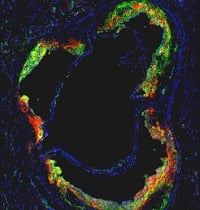 |
| HDL nanoparticles (green) target inflammatory cells (red) in a blood vessel.--Courtesy of Mount Sinai |
High-density lipoproteins (HDLs) are a key component in the transportation of molecules such as cholesterol and fats inside the body. And by using a synthetic nanoparticle version of these natural vehicles, researchers have found a way to deliver drugs to the heart that could potentially prevent repeat heart attacks or stroke.
Scientists from the Icahn School of Medicine at Mount Sinai published a study in the journal Nature Communications that shows that an HDL nanoparticle loaded with cholesterol-lowering statins could target and reduce inflammation in blood vessels. Often, after a heart attack, such levels have been known to cause a second heart attack or stroke due to a ruptured clot.
The nanoparticle the team used resembles the "good" HDL cholesterol particle and binds to the same receptors as the natural version to deliver the statin drug, according to a report from Mount Sinai. Oral statins work through the liver to reduce "bad" LDL cholesterol levels and have a small effect on inflammatory cells in the arteries.
But introducing the HDL nanoparticle right after the treatment of the clot that produces a heart attack or stroke can hit it at the right moment, the researchers say.
"Levels of inflammation spike after a heart attack, which is why up to 30% of heart attack patients may suffer another heart attack, some while in hospital or just after discharge," study co-author Zahi Fayad said in a statement. "This is the vital time to attack this inflammation culprit, which we currently are unable to do clinically right now. Even with the most aggressive treatment available, repeat heart attacks do occur."
In mouse studies, the statin-HDL nanoparticle regimen decreased inflammation when injected in the bloodstream, accumulating at the lesions--and did it safely.
"Our study also confirms that the HDL nanoparticle is not seen as a foreign invader by the body's immune system and that it has an inherent and natural affinity to target plaque macrophages," said co-author Jun Tang.
Fayad added: "If proven to be safe and effective in humans, this would be a critical advance for cardiovascular medicine."
- here's the Mount Sinai report
- and here's the abstract